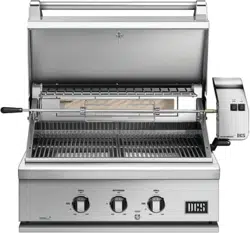Loading ...
Loading ...
Loading ...

4
For personal safety, wear proper apparel. Loose fitting garments or sleeves should never be worn while using
this appliance. Some synthetic fabrics are highly flammable and should not be worn while cooking. Only certain
types of glass, heat-proof glass ceramic, earthenware, or other glazed utensils are suitable for grill use. Use of
these types of materials may break with sudden temperature changes. Use only on low or medium heat settings
according to the manufacturer’s directions.
WARNING!
Spiders and insects can nest in the grill burners, causing the gas not to flow through the burner. The gas will flow
from the front of the burner into the control panel. This is a very dangerous condition which can cause a fire to occur
behind the valve panel, thereby damaging the grill components and making it unsafe to operate.
WARNING!
Keep the area surrounding the grill free from combustible materials, trash, or combustible fluids and vapors such as
gasoline or charcoal lighter fluid. Do not obstruct the flow of combustion and ventilation air.
WARNING!
Never use the grill in windy conditions. If located in a consistently windy area (oceanfront, mountaintop, etc.) a wind
break will be required. Always adhere to the specified clearances as defined in the “INSTALLATION” section of this
manual.
When using the side burners always use flat bottomed pans which are large enough to cover the side burner.
Adjust the flame so that it heats only the bottom of the pan to avoid ignition of clothing. Position handles inward
PREFERRED
AIR FLOW
GRILL EXHAUST
EXHAUST
FLAME
BURNER
Wind hitting the grill
while in use,
especially winds
blowing into or across
this hood gap, can
cause poor
performance and in
some cases can cause
the control panel and
knobs to get
dangerously hot.
WIND
GRILL PLACEMENT
n
Never let clothing, pot holders or other flammable materials come in contact with or get too close to any grate,
burner or hot surface until it has cooled. Fabric may ignite and result in personal injury.
n
Do not heat unopened food containers as a build-up of pressure may cause the container to burst.
n
Always use a covered hand when opening the grill lid and only do so slowly to allow heat and steam to escape.
n
Never lean over an open grill. When lighting a burner, always pay close attention to what you are doing. Be certain
you are pushing the control knob when you attempt to light the grill.
n
After lighting burners, make sure burners are operating normally (see page 21).
n
When using the grill, do not touch the grill burner, grate or immediate surrounding area as these areas become
extremely hot and could cause burns.
n
Grease is flammable. Never operate the grill without a grease tray. Let hot grease cool before attempting to
handle it. Avoid letting grease deposits collect in the drip pan. Clean often.
n
Do not use aluminum foil to line drip pans, grill grates or radiants. This can severely upset combustion air flow or
trap excessive heat in the control area. The result of this can be melted knobs or damaged ignition components.
n
Do not operate with a damaged cord or plug or after the appliance malfunctions or has been damaged in any man-
ner. Contact the manufacturer for repair.
n
Do not let the rotisserie motor cord hang over the edge of a table or touch hot surfaces.
n
Do not use an outdoor cooking appliance for purposes other than intended.
SAFETY PRACTICES & PRECAUTIONS
FLAME LIFT
WIND
WIND
PRIMARY
INTAKE
AIR FLOW
If wind is an
issue, a wind
screen should
be added. The
wind screen
should be
higher than
the top of the
opening in the
back of the
grill, with a
minimum
clearance of 3"
(7,6cm) (for
non-combusti-
bles) or 18"
(45,7cm) (for
combustibles)
from the back
WIND SCREEN
WIND
15” min.
(38,1cm)
EXHAUST VENT FLOW
3”
(7,6 cm) min.
for non-
combustibles
18” (45,7cm)
min.
for combustibles
Loading ...
Loading ...
Loading ...
